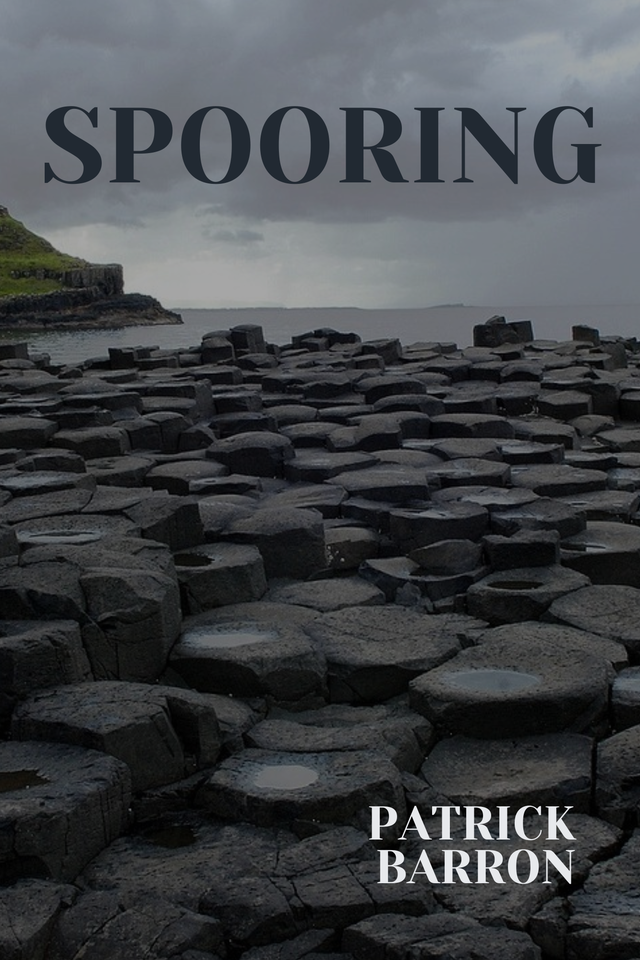- Poetry
- >
- Spooring by Patrick Barron
Spooring by Patrick Barron
The interconnected texts in Spooring have their origin in a slow journey down the Apennine Mountains in central and southern Italy over the course of a number of months. The genre is mixed. Poems trade places with short prose passages and transcriptions of road signs. Footnotes interrupt throughout, tempting fragments and byways. There are also a number of photographs and maps. The project is inspired in part by Robert Smithson’s idea that “language should find itself in the physical world, and not end up locked in an idea in somebody’s head,” and also the corollary—that the physical world can find itself in language. Any text risks fossilizing ideas, and perhaps all the more so texts that take as their inspiration the physical world, since the overpowering immediacy of certain places tends to trick us into believing that language generated in response or dialogue will remain somehow authentic to those places. And the heady state of the cross-country walker is vulnerable to corruption, to believing that an empathetic dialectic with the physical world is translatable. To connect ideas to matter, thoughts to place, through language engaged with language. Not a fixed relief map, but a moveable index of small traces, tracks, words, and images, messages half-dismantled, enough to begin a paragraph or stanza, but not necessarily to finish.
Details
Genre: Poetry
ISBN:978-1-950730-33-9
Publication Date: March 17, 2020
Advance Praise
The sharp energy of this poem, as it roams Italian mountains, calls us to our senses – as well as to sensory delight in a world of cicadas, juniper, barrelling clouds, the ‘taste / of furzy space’. This is also a social, peopled landscape, full of signs, its many rhythms reflected in cuts and swerves through poetry, images and prose. Footnotes, inventively deployed as a parallel stream of attention, take the form of ‘Roads grafted /onto other roads’ that hook the route of the poem into the multiple universes of other texts, so that the impression is of travelling sideways, outwards and through one dimension and into others. It’s in these traces of interlocking lives, and in the looping paths of understanding between them, that Spooring transforms images of rural locality, discovering the potential for new collectivities and encounters. --Zoë Skoulding |
Part transposed Basho heading south not north, part site specific artist loosing language from the material world’s medias res, Patrick Barron’s Spooring is a caress down the spine of the Apennines, weaving its way into song. Both travelogue and commonplace book, a landscape of quotations and a quotation of landscape, this major long poem samples the silence of ancient rock, improbably preserved alpine forest, the glinting eyes of our human and nonhuman kin. Sit back weary reader/traveller—your guide is ready to sing a mountain song, an incomparable melodia dolce to take you to “that place / within / pacings’ / meditation.” |
In the interstices artfully assembled in Patrick Barron’s Spooring, the “smack of the infinite” peeps out with evident appetite and curiosity. Although it appears to be a book, Spooring is less text than textile, interweaving lore, observations, terrestrial coordinates and bibliographic ruminants in a carefully layered fabric all its own, in the manner of riprap. An enthralling journey by a welcoming mind. |
Patrick Barron’s Spooring is a radical act of attention. In sinuous poetry and lucid rushes of prose, he tracks the Apennines in vivid granularity, pulling us forward to the next crumbling farmhouse, methane pipeline sign, or meal shared with a stranger. A polyphony of shelter and exposure, love and degradation, isolation and strange fellowship, his hybrid form is seduced by the berm and rooted the genius of the body, from “dust-caressed rocks” to insects who “spawn across the yawning/ sidereal stone expanse.” “Everything here/so precarious” he tells us, and yet with a “a little bit of sweat,” we can learn to trace “a bliss that so playfully/painfully/ scampers off/again and/again." |
